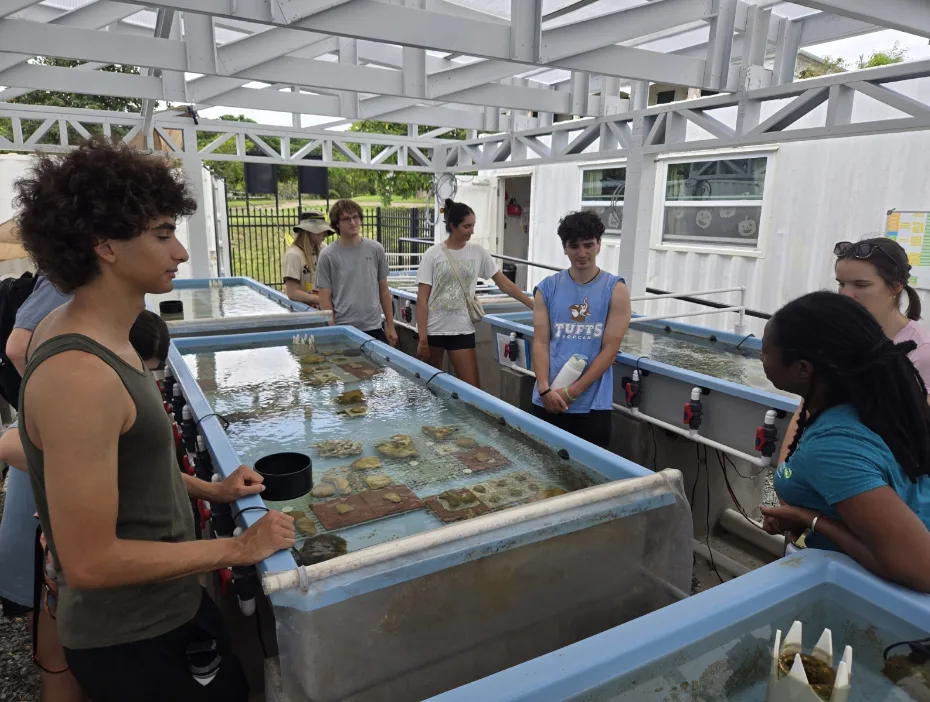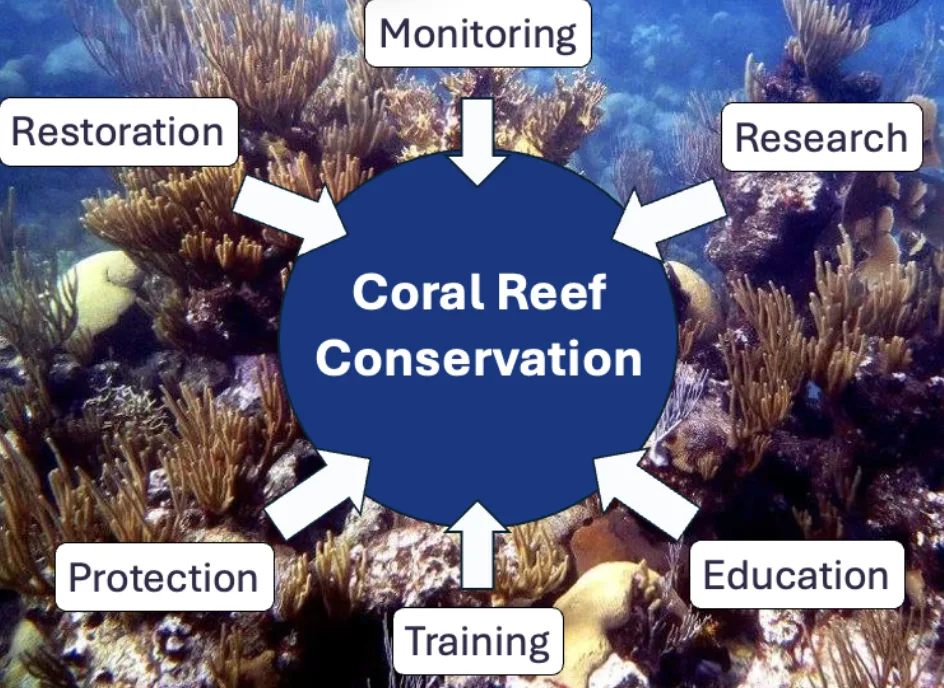Programs Blog
A Holistic, Determined Mindset to Conservation

Wednesday, October 30th, 2024
Location: Crocus Hill, Anguilla
Weather: 86°F, Humidity 70%, Feels like 95°F
Hello again!
This is Katie Hallee tuning in for another blog post! In case you are new to the blog, I am a junior studying environmental science at Wheaton College, Massachusetts. Currently, the Coral Reef Conservation Program Caribbean (CRCC) program is approximately halfway through our field component in the Caribbean. Oh, how time has flown by! So far, we have spent about a week and a half on both the islands of St. Croix and Anguilla. On each island we visit during our field component, we are conducting coral reef surveys at two sites. During our reef survey days, we collect benthic, fish, invertebrate, rugosity, and water chemistry data! However, with the whirlwind of data collection, classwork, and exploration we have been consumed by, I find it easy to begin to focus on day-to-day details and stray away from the big picture of our overall research goals: conserving Caribbean coral reefs. So, today I will be reflecting on how my understanding of coral conservation has evolved throughout the entirety of the program thus far.
When I told my friends and family about this program, I would often get a very similar response. When people heard the words coral, the Caribbean, and snorkeling, they would tend to tell me, “Ah, so you are going to be at the beach all semester. That sounds like a vacation!” Don’t get me wrong, I am incredibly grateful for this unique, diverse, and hands-on research experience. However, what people do not realize is the field of coral reef conservation is incredibly bleak. From speaking to coral scientists on both St. Croix and Anguilla, I have learned that you have to be a strong-willed and resilient person to devote your life and career to coral conservation. In the media, corals are often still perceived as vibrant and lively underwater ecosystems. The fact of the matter is corals are in crisis. Not just in the Caribbean, but globally. These remarkable animals capable of building complex marine habitats are threatened by intensifying stressors: ocean warming, acidification, sedimentation, pollution, fishing, nutrient runoff, and invasive species. These stressors cause corals to bleach, the process of expelling their symbiotic algae called zooxanthellae and leaving their bare calcium carbonate skeleton. Without these algae, corals have to rely only on filter feeding for their energy instead of photosynthesis previously performed by the zooxanthellae. As a result, corals are dying at an unprecedented rate. This circles back to my point that coral scientists must be unyielding in their determination to conservation. They are forced to constantly deal with the reality that corals are disappearing before their eyes.
As depressing as the condition of coral health currently is, I have learned that these strong-willed scientists show up every day on the job, working diligently to combat such stressors. I think this program has brought me a newfound sense of consciousness concerning the complexity of coral conservation as a whole. My oceanography professor, Dr. Heather Page, has helped me to evolve my mindset to visualize coral conservation as multifaceted. This is because one specific visualization from Heather’s lectures has stuck with me since I first saw it. Coral conservation is the main focus in the center, with six different arrows pointing in. These arrows are labeled with restoration, monitoring, research, protection, training, and education. This attests to the network of factors all influencing coral conservation at once. Therefore, I now have evolved my ideas to believe that we must approach conservation holistically. For instance, outplanting thousands of coral fragments for restoration will fail to be successful without training more people on how to outplant, researching what areas need those corals the most, monitoring those corals, protecting those corals with legislative action against carbon emissions, and educational outreach to local communities. Each of these factors relies on each other, and to make strides in the field of coral conservation, it is vital to recognize these factors as a whole.
With Dominica and Barbados still on our horizon, I am looking forward to continuing to adapt my perspective and understanding of coral reef conservation. I would like to express my gratitude to Semoya from The Nature Conservancy for showing us current approaches to fragmentation coral restoration. Thank you to Clarissa from the Anguilla National Trust for taking the time to teach us about the history of the island. I would also like to thank Jasmine, Remone, and Zoya for showing us around the Department of Natural Resources. It was very engaging to hear about the diverse marine research projects happening simultaneously in Anguilla. Lastly, thank you to Chrissy for welcoming us and being such a gracious host. We appreciate you!
Until next time,
Katie

Recent Posts from the Ships
- SEA Writer 2022, Magazines From the Summer SEA Quest Students
- PIPA Alumni Reconnect with Children of Kanton
- Woods Hole Welcomes Incoming Class of PEP Students
- Muhlenberg Student Finds Perfect Study Abroad Experience with SEA Semester
- SEA Student Describes Pacific Exploration for University of Denver News
Programs
- Gap Year
- Ocean Exploration
- High School
- Science at SEA
- SEA Expedition
- SEAScape
- Pre-College
- Proctor Ocean Classroom
- Protecting the Phoenix Islands
- Sargassum Ecosystem
- SPICE
- Stanford@SEA
- Undergraduate
- Climate and Society
- Climate Change and Coastal Resilience
- Coral Reef Conservation
- Marine Biodiversity and Conservation
- MBL
- Ocean Exploration: Plastics
- Ocean Policy: Marine Protected Areas
- Oceans and Climate
- Pacific Reef Expedition
- S-299 Summer Session
- The Global Ocean: Hawai'i
- The Global Ocean: New Zealand